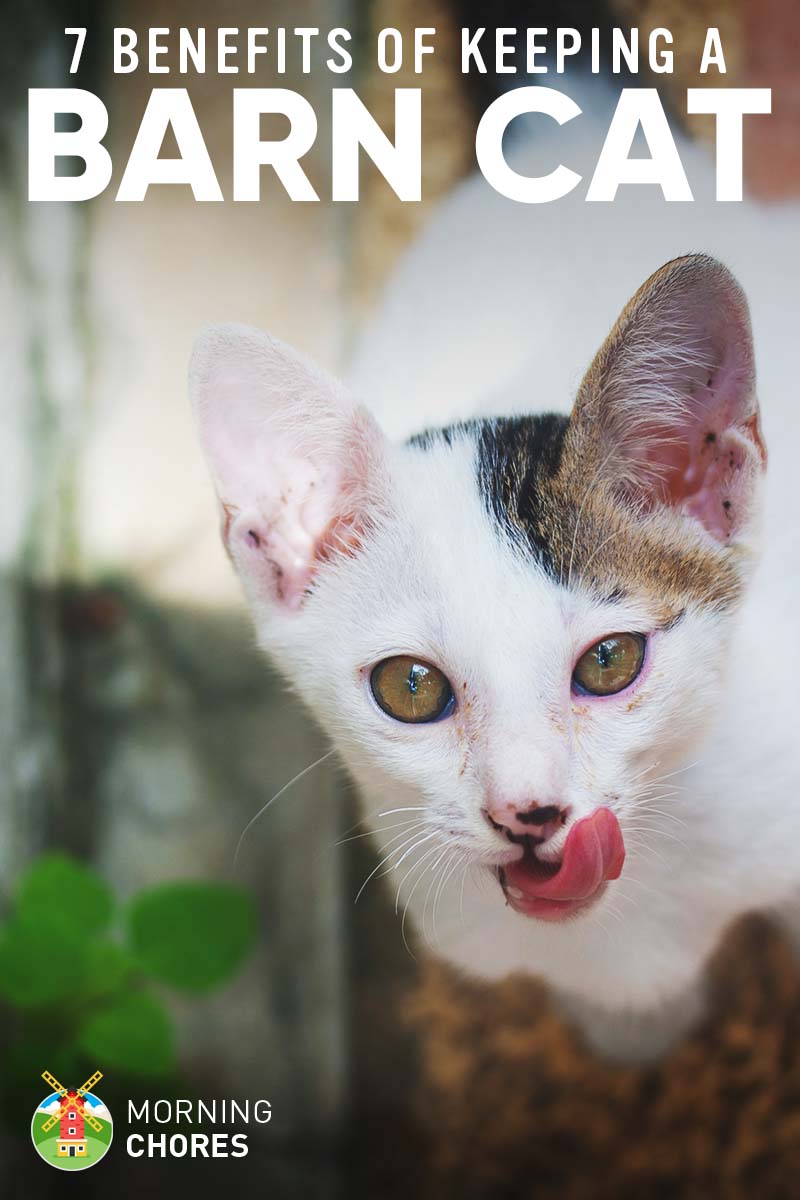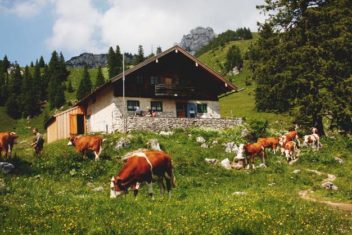Do you have stray cats that hang around your house? Do you often wish they wouldn’t?
Well, don’t write off those cats so quickly. If you have a barn or a homestead of any kind, then you probably have a lot of use for those stray cats.
You may not realize it but those cats can serve your homestead quite well.
I’d like to share with you a few of the benefits of having a barn cat. As well as how you should care for one and which breed I recommend.
Why You Should Consider a Barn Cat
Barn cats are not just stray cats that linger. They are far more valuable than that, but I will begin by sharing this resource with you on how to recognize illnesses in barn cats. It is important to understand that they are animals that can potentially carry disease so you need to be aware of that upfront.
However, they also serve amazing purposes around your homestead too
1. They make great friends
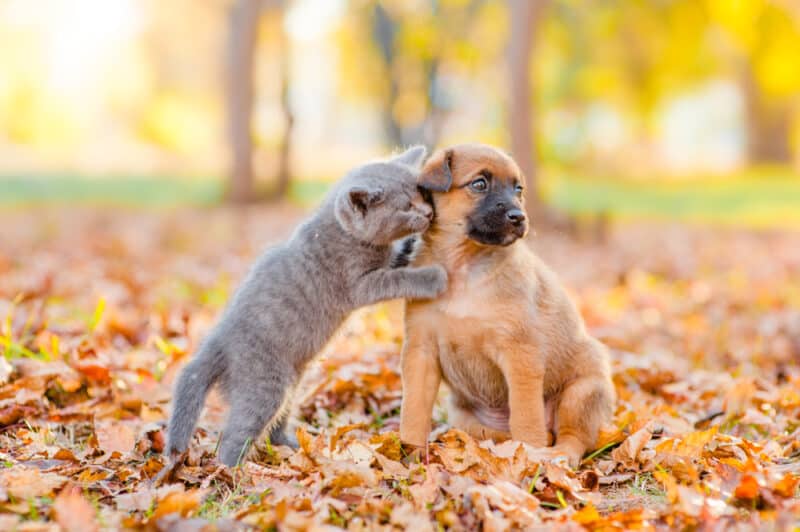
Barn cats are not necessarily great companions for the farmer, but they are often great companions to other animals. This will depend greatly upon their personal disposition that does vary from animal to animal.
However, in my own experience, I have seen a few barn cats take up with the dog and a few goats too.
I wouldn’t invest in a barn cat for this purpose alone, but it could be a nice bonus to having a barn cat around.
2. They eat bugs
This is definitely a reason to invest in keeping a barn cat around. If you have a homestead or a barn, then you have bugs.
If you’d like to keep those bugs at a minimum, then a barn cat could potentially help you with that. Most cats enjoy hunting and killing their prey.
Well, bugs fall into that category. So if you are being overrun with pests, then a barn cat could potentially fix that issue for you.
3. They make great exterminators
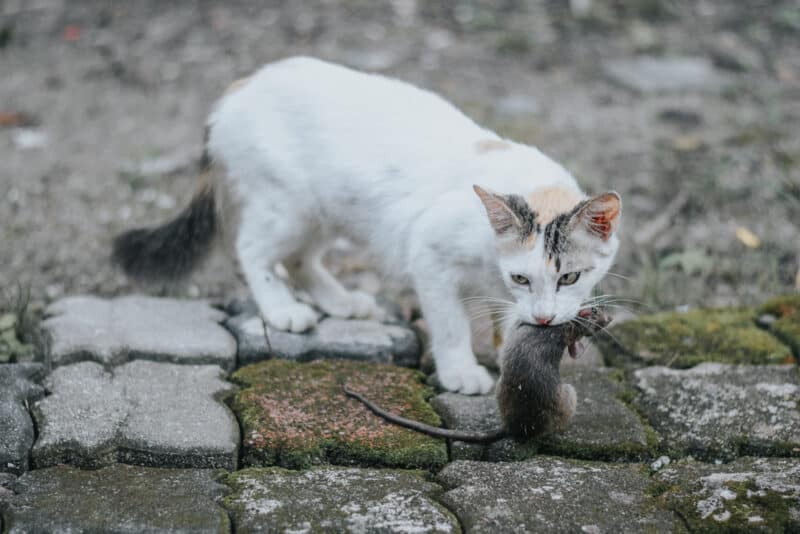
This is why I keep cats both indoors and outdoors. I don’t care much for rodents. I don’t like rats, mice, or anything else that I might randomly come across inside my feed bins.
You should begin by keeping these critters at bay by storing your feed inside big metal barrels that make it more difficult for rodents to eat their way through.
However, sadly, that probably won’t do the trick at keeping them away for good. This is where having a barn cat around comes in handy.
You just need to keep a couple of cats around your property, and you’ll likely find that your rodent population will begin to decline.
As I mentioned, I feed a lot of stray cats that come across our property so they’ll hang around and eat any outdoor mice.
Plus, I keep 2 indoor cats so I don’t end up with a mouse in the house. In our years at our homestead, I think we’ve had one mouse and it barely made it out of the air vent before our calico cat stopped it in its tracks.
Cats are very handy animals around the homestead.
4. They save you money
You might think that another animal will only cost you money and it is true that your barn cat will still need proper care.
Still, they will save you money too. The reason is that with each rodent they eat and each bug they deter, then that is one less pest that is consuming your feed.
As you well know, feed is costly. If you compare how much money you’ll save in lost feed in comparison to giving a cat or cats shots once a year, the savings pile up quickly.
5. Make the barn a happier place
Cats have a way of making people happy. They are peaceful and generally sweet creatures. If anything, they are a little skittish.
Not to mention, most kids love to look at cats. So if you have kids around, then you might want to find a friendlier or more social barn cat to add a little joy around your barn.
6. They are low maintenance
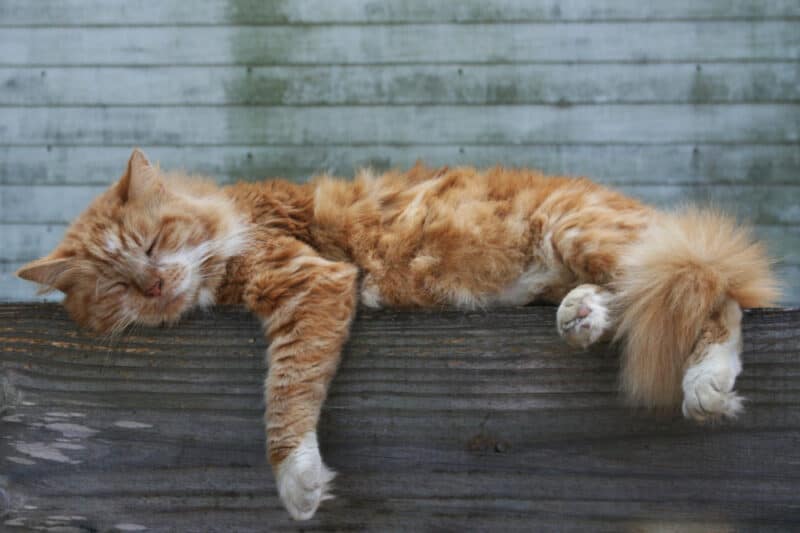
I will discuss the care for a barn cat in great detail below, but in general, barn cats are rather low maintenance animals. They require a few shots to keep them disease-free.
Plus, you might want to consider placing organic diatomaceous earth on them to keep the fleas off of them as well.
However, beyond that, they need very little and usually give a whole lot back. You don’t get a whole lot lower maintenance than keeping cats around your barn.
7. Give an orphaned animal a home
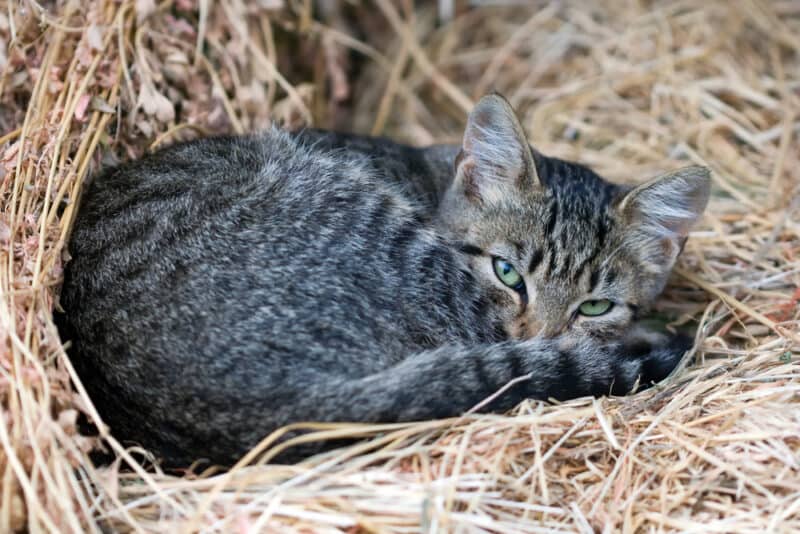
Most barn cats are usually stray or orphaned cats that have nowhere else to live. Yet, if you give them a home in your barn or around your homestead, then these cats now have a place to call home and a purpose.
That is an amazing thing to consider when taking in a barn cat. There are actually programs that allow you to adopt feral cats for this exact purpose. We are in no way affiliated with these programs so you’ll have to do your research before choosing which one to adopt from.
If you think you could utilize the benefits of a barn cat, then why not adopt a feral cat that would most likely do a wonderful job for you around your barn and homestead.
How to Care for a Barn Cat
If you decide to adopt a barn cat, then you need to know how to care for them. Just because the cat will be living in your barn, doesn’t mean that they won’t need adequate care. It is still your animal and your responsibility to keep them healthy.
Here are a few steps to take to keep your barn cats as healthy and well cared for as you can:
1. Spay or Neuter
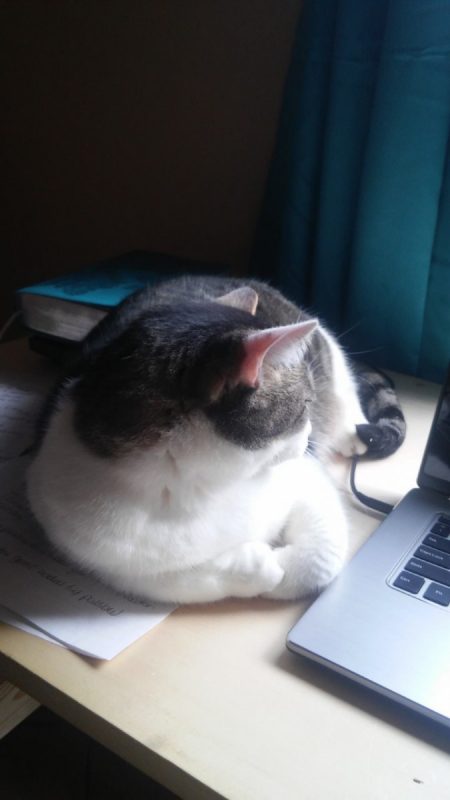
The first thing you want to do when keeping a barn cat is to make sure that they are spayed or neutered. The reason is obvious as you don’t want a lot of cats running around your property.
Then you are adding to the issue of feral cats instead of taking a formerly feral cat and giving it a home.
Be responsible if you decide to keep a barn cat and be sure to spay or neuter them. You might want to check around your community if you feel this would be too expensive for your budget.
Some communities offer an income-based program where you can get your animal spayed or neutered at a discounted rate. The Humane Society website offers a way for you to enter your zip code and locate discounted programs in your area.
2. A Trip to the Vet
The next thing you need to do in order to care for your barn cat is to be sure to take them to see a vet. You need to make sure that they are up to date on all of their vaccinations including their rabies shot.
Because this will be an outdoor animal you have to realize that they are more susceptible to dealing with predators and wild animals.
Keeping your barn cat fully vaccinated will keep them from dealing with a lot of illnesses that they could possibly come in contact with outdoors.
However, if you don’t have a vet near you or are afraid of the expense, certain stores (like Tractor Supply) have days when a vet clinic is offered in their stores. They are usually less expensive than going to a vet’s office.
This great resource will help you humanely catch your barn cat when it is time to get them their shots.
3. A Place to Lay Their Head
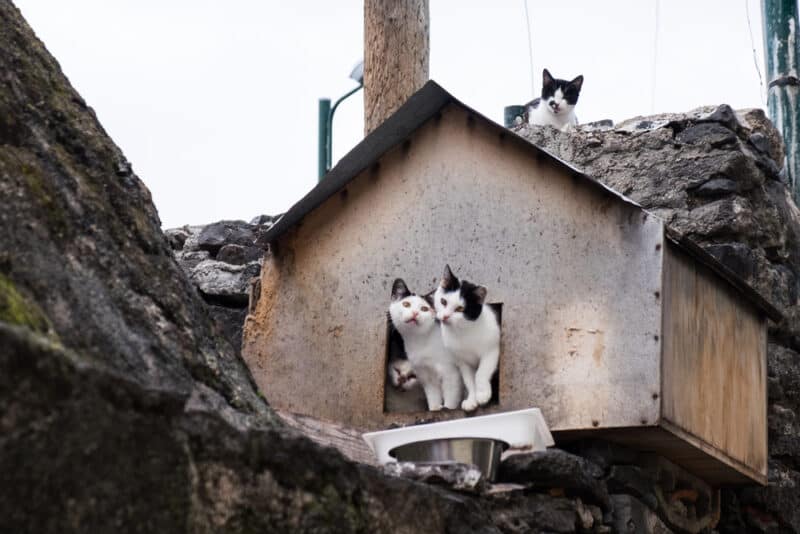
Barn cats don’t require a lot of attention. In fact, some would prefer to be left alone and let them live out their lives happily keeping your barn and homestead free of pests and rodents that will eat your grains and ruin your garden.
However, they do require a few basic needs so it will feel more like home to them, and they’ll stick around your property.
The first thing they’ll need is a place to use as a den. This can be as simple as a closed plastic tub with a large hole in the side for them to get in and out. You’ll place bedding at the bottom of the tub such as hay or old blankets.
Or you could do what my mom does for the stray cats she keeps around her property. She actually bought her cat a heated bed and placed a little tent of cloth over the top of it. Needless to say, her outdoor cats are a little spoiled.
And would you believe that these cats won’t let her pet or touch them, but they’ll curl up in this heated cat bed and not move for days whenever snow hits?
So don’t think that a feral cat won’t enjoy a little luxury.
4. Food and Water are a Must
The second thing you need to provide your barn cat is food and water. This may sound like a no-brainer, but you’d be surprised how many people think that they shouldn’t feed their outdoor barn cats because then they won’t eat the rodents and bugs.
If you don’t feed the cats, then when they eat up all of the food around your barn they’ll move on.
Then your bug and rodent problem will return. So keep a bowl of dry food out and available to your barn cats daily.
Plus, be sure to give them a supply of clean water to drink from regularly. When you are feeding all of the other animals in the mornings, be sure to add the barn cats to your routine to make sure they have all they need.
5. Don’t Let Curiosity Kill Your Cat
Cats are naturally curious creatures. This means if you have something within their reach, they are probably going to check it out if it strikes their fancy.
If you have anything that could be toxic to a cat, you need to take special care to place it in a location that they cannot get into. Keep this in mind when leaving different items around your barn.
My Experience with Barn Cats
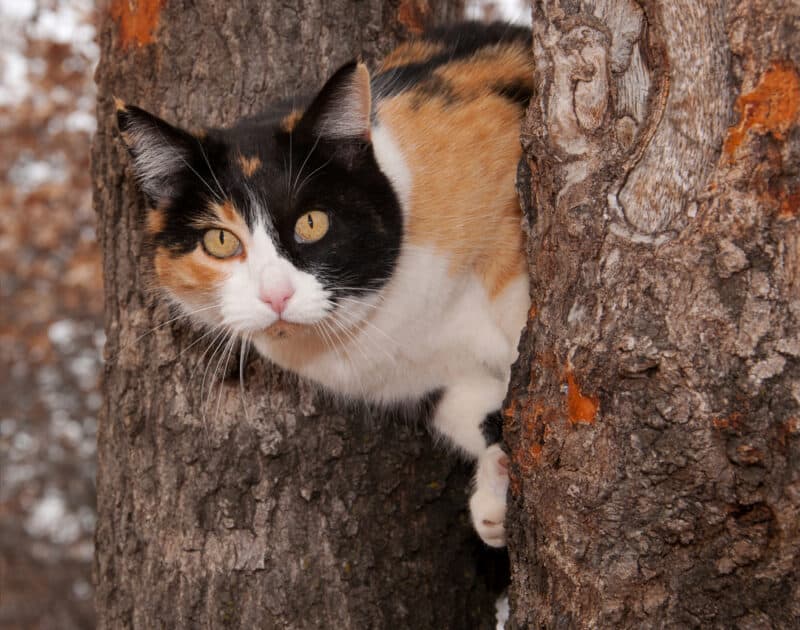
Choosing your own barn cat is a personal choice, but I would like to offer my experience to you, and you can do with it as you wish.
I have had 2 calico cats in my life. They were both female and both were marvelous hunters. So if you have the option of using a calico for a barn cat, you might want to give it a try.
I will warn you upfront, they are not the friendliest of cats. Sometimes they can actually have quite the attitude.
However, they are tough, independent, and love to hunt. The 2 I have had definitely did their job. And they live for a long time, so I’ve only needed 2 in my lifetime.
Again, this is just my experience. If you have small children around, then you might want to consider a friendlier breed.
Plus, I’m also a huge fan of adopting animals. I love the idea of giving an animal a home when they don’t have one.
If you feel the same, check with your local shelters to find a feral cat that would make a great barn cat.
Or you could also research the feral cat programs to find a cat to give it a home and a job. Again, this is your preference.
